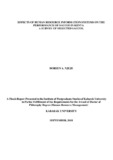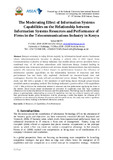EFFECTS OF HUMAN RESOURCE INFORMATION SYSTEMS ON THE PERFORMANCE OF SACCOS IN KENYA A SURVEY OF SELECTED SACCOS.
Abstract
The human resource information system is a concept which utilizes the information technology for effective management of the human resource, its functions and applications. It has been established through empirical review that more of the organizations have not been able to use the HRIS for strategic decision making in human resource department. This study will benefit the Sacco management, human resource department and the human resource personnel and scholars in the human resource specialization in applying strategic decision making in human resource management based on the information obtained from HRIS. The main purpose of the research was to investigate the effects of human resource information system functions on organization performance a survey of selected Saccos in Kenya. This was necessitated by the fact that despite the Saccos having the HRIS modules there has not been a study to show on how these modules affect the organization performance. The study therefore aimed to explore the effect of e-training and development systems, e-performance management systems, estaffing systems and e-human resource planning systems on organization performance in Saccos. The theories and models underpinning the study included technology acceptance model the systems theory and human resource information system model and the resource flow model. The study employed a cross sectional survey design which had the census technique which targeted 54 respondents and purposive sampling was used to select the 54 respondents who were mainly the employees in the human resource department. Questionnaires was used as the data collection instruments and data were qualitative and quantitative in nature. Data was analyzed using descriptive and inferential statistics and correlation and presented in tables. The validity and reliability of the instrument was determined by Cronbach alpha. The results showed that E-training and development, Eperformance management and E-staffing have a significant effect on the performance of Saccos with the p value being 0.001, 0.004 and 0.023 respectively where p, <0.05 and EHuman resource planning had no significant effect on the organization performance with a p value of 0.432 where p>0.05. The study therefore recommended that management should engage more in strategic decision making using the HRIS system and provide further assistance in human resource planning and training in the use of HRIS.
Collections
Related items
Showing items related by title, author, creator and subject.
-
The Moderating Effect of Information Systems Capabilities on the Relationship between Information Systems Resources and Performance of Firms in the Telecommunications Industry in Kenya
Alfred BETT, Alfred (KABARAK UNIVERSITY, 2020-10-05)Kenya’s economy is today driven majorly by information-based service businesses where telecommunication industry is playing a critical role. A 2018 report from Communications Authority of Kenya indicates that mobile phone ... -
Information systems (IS) for competitive intelligence (CI) in small and medium enterprises
Dinda, Wilkister (Kabarak University, 2016)Information systems have emerged to be a powerful tool for driving competitive advantage for firms Prior research has shown that very few SMEs use the analytical power of IS to drive their performance especially in ... -
Access to Higher Education in a Devolved System of Government
Otieno, Daniel (Kabarak University, 2016)The Constitution of Kenya was formally promulgated into law on 27th August 2010 (Mwenda, 2010). The New Constitution (2010) dramatically changed the system of governance from a centralized bureaucracy to a devolved ...


